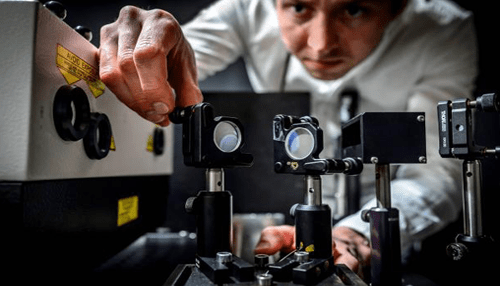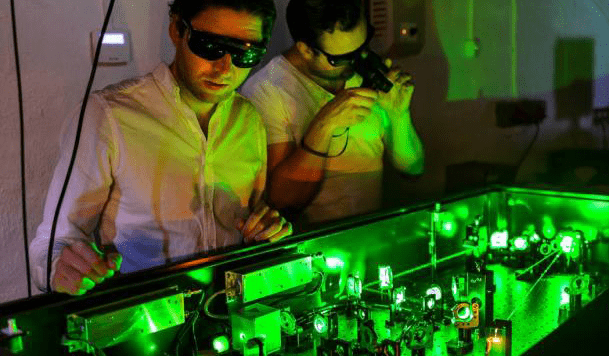A regular camera with a flash uses regular light, but in this case, the researchers use “coded” light flashes as a form of encryption. Every time a coded light flash hits the object—for example, a chemical reaction in a burning flame—the object emits an image signal (response) with the exact same coding. The following light flashes all have different codes, and the image signals are captured in one single photograph. These coded image signals are subsequently separated using an encryption key on the computer.
A German company has already developed a prototype of the technology, which means that within an estimated two years more people will be able to use it.
Forget high-speed cameras capturing 100,000 images per second. A research group at Lund University in Sweden has developed a camera that can film at a rate equivalent to five trillion images per second, or events as short as 0.2 trillionths of a second. This is faster than has previously been possible.
The new super-fast film camera will therefore be able to capture incredibly rapid processes in chemistry, physics, biology, and biomedicine that, so far, have not been caught on film.
To illustrate the technology, the researchers have successfully filmed how light – a collection of photons—travels a distance corresponding to the thickness of paper. In reality, it only takes a picosecond, but on film, the process has been slowed down by a trillion times.
Currently, high-speed cameras capture images one by one in a sequence. The new technology is based on an innovative algorithm and instead captures several coded images in one picture. It then sorts them into a video sequence afterward.
In short, the method involves exposing what you are filming (for example, a chemical reaction) to light in the form of laser flashes, where each light pulse is given a unique code. The object reflects the light flashes, which merge into a single photograph. They are subsequently separated using an encryption key.
The film camera is initially intended to be used by researchers who literally want to gain better insight into many of the extremely rapid processes that occur in nature. Many take place on a picosecond and femtosecond scale, which is unbelievably fast—the number of femtoseconds in one second is significantly larger than the number of seconds in a person’s lifetime.
“This does not apply to all processes in nature, but quite a few; for example, explosions, plasma flashes, turbulent combustion, brain activity in animals, and chemical reactions. We are now able to film such extremely short processes,” says Elias Kristensson. “In the long term, the technology can also be used by industry and others.”.
For the researchers themselves, however, the greatest benefit of this technology is not that they set a new speed record, but that they are now able to film how specific substances change in the same process.
“Today, the only way to visualise such rapid events is to photograph still images of the process. You then have to attempt to repeat identical experiments to provide several still images which can later be edited into a movie. The problem with this approach is that it is highly unlikely that a process will be identical if you repeat the experiment”, he says.
Most days, Elias Kristensson and Andreas Ehn research combustion, an area that is known to be complicated to study. The ultimate purpose of this basic research is to make next-generation car engines, gas turbines, and boilers cleaner and more fuel-efficient. Combustion is controlled by a number of ultra-fast processes at the molecular level, which can now be captured on film.
For example, the researchers will study the chemistry of plasma discharges, the lifetime of quantum states in combustion environments and in biological tissue, as well as how chemical reactions are initiated. In the autumn, there will be more film material available.
Source: Lund University Research




